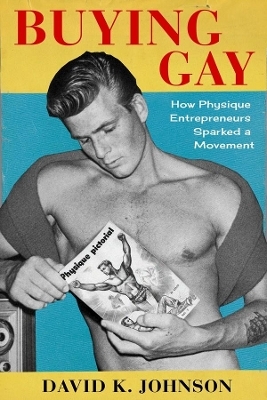
Buying Gay
How Physique Entrepreneurs Sparked a Movement
Seiten
2019
Columbia University Press (Verlag)
978-0-231-18910-1 (ISBN)
Columbia University Press (Verlag)
978-0-231-18910-1 (ISBN)
David K. Johnson tells the story of the physique magazine produced by and for gay men to show how gay commerce was not a byproduct of the gay-rights movement but an important catalyst for it. He offers a vivid look into the lives of physique entrepreneurs and their customers, presenting a wealth of illustrations.
In 1951, a new type of publication appeared on newsstands—the physique magazine produced by and for gay men. For many men growing up in the 1950s and 1960s, these magazines and their images and illustrations of nearly naked men, as well as articles, letters from readers, and advertisements, served as an initiation into gay culture. The publishers behind them were part of a wider world of “physique entrepreneurs”: men as well as women who ran photography studios, mail-order catalogs, pen-pal services, book clubs, and niche advertising for gay audiences. Such businesses have often been seen as peripheral to the gay political movement. In this book, David K. Johnson shows how gay commerce was not a byproduct but rather an important catalyst for the gay rights movement.
Offering a vivid look into the lives of physique entrepreneurs and their customers, and presenting a wealth of illustrations, Buying Gay explores the connections—and tensions—between the market and the movement. With circulation rates many times higher than the openly political “homophile” magazines, physique magazines were the largest gay media outlets of their time. This network of producers and consumers helped foster a gay community and upend censorship laws, paving the way for open expression. Physique entrepreneurs were at the center of legal struggles, especially against the U.S. Post Office, including the court victory that allowed full-frontal male nudity and open homoeroticism. Buying Gay reconceives the history of the gay rights movement and shows how consumer culture helped create community and a site for resistance.
In 1951, a new type of publication appeared on newsstands—the physique magazine produced by and for gay men. For many men growing up in the 1950s and 1960s, these magazines and their images and illustrations of nearly naked men, as well as articles, letters from readers, and advertisements, served as an initiation into gay culture. The publishers behind them were part of a wider world of “physique entrepreneurs”: men as well as women who ran photography studios, mail-order catalogs, pen-pal services, book clubs, and niche advertising for gay audiences. Such businesses have often been seen as peripheral to the gay political movement. In this book, David K. Johnson shows how gay commerce was not a byproduct but rather an important catalyst for the gay rights movement.
Offering a vivid look into the lives of physique entrepreneurs and their customers, and presenting a wealth of illustrations, Buying Gay explores the connections—and tensions—between the market and the movement. With circulation rates many times higher than the openly political “homophile” magazines, physique magazines were the largest gay media outlets of their time. This network of producers and consumers helped foster a gay community and upend censorship laws, paving the way for open expression. Physique entrepreneurs were at the center of legal struggles, especially against the U.S. Post Office, including the court victory that allowed full-frontal male nudity and open homoeroticism. Buying Gay reconceives the history of the gay rights movement and shows how consumer culture helped create community and a site for resistance.
David K. Johnson is professor of history at the University of South Florida. He is the author of The Lavender Scare: The Cold War Persecution of Gays and Lesbians in the Federal Government (2004), which was made into an award-winning documentary.
Preface
List of Illustrations
Introduction
1. Emerging from the Muscle Magazines: Bob Mizer’s Athletic Model Guild
2. Selling Gay Books: Donald Webster Cory’s “Business with a Conscience”
3. The Grecian Guild: Imagining a Gay Past, and Future
4. “I Want a Pen Pal!”: Postmaster General Arthur Summerfield and the Adonis Male Club
5. Defending a Naked Boy: Lynn Womack at the Supreme Court
6. Consolidating the Market: DSI of Minneapolis
7. The Physique Legacy
Acknowledgments
Abbreviations
Notes
Index
| Erscheinungsdatum | 01.03.2019 |
|---|---|
| Reihe/Serie | Columbia Studies in the History of U.S. Capitalism |
| Zusatzinfo | 55 figures |
| Verlagsort | New York |
| Sprache | englisch |
| Maße | 156 x 235 mm |
| Themenwelt | Recht / Steuern ► Allgemeines / Lexika |
| Recht / Steuern ► EU / Internationales Recht | |
| Sozialwissenschaften ► Kommunikation / Medien ► Medienwissenschaft | |
| Sozialwissenschaften ► Soziologie ► Gender Studies | |
| Wirtschaft ► Allgemeines / Lexika | |
| ISBN-10 | 0-231-18910-9 / 0231189109 |
| ISBN-13 | 978-0-231-18910-1 / 9780231189101 |
| Zustand | Neuware |
| Informationen gemäß Produktsicherheitsverordnung (GPSR) | |
| Haben Sie eine Frage zum Produkt? |
Mehr entdecken
aus dem Bereich
aus dem Bereich
Eine Einführung
Buch | Softcover (2022)
Springer VS (Verlag)
CHF 46,15
wie KI und virtuelle Welten von uns Besitz ergreifen – und die …
Buch | Hardcover (2023)
Heyne (Verlag)
CHF 29,90
Buch | Softcover (2023)
Passagen (Verlag)
CHF 25,20


